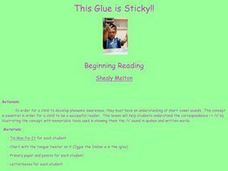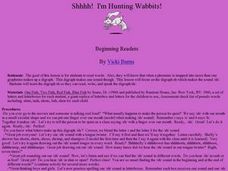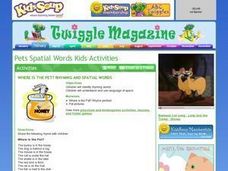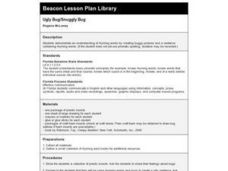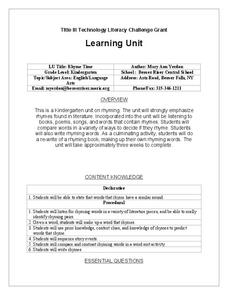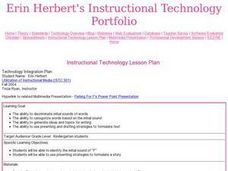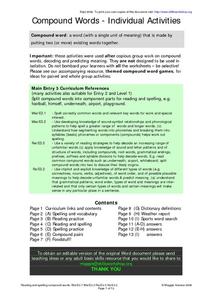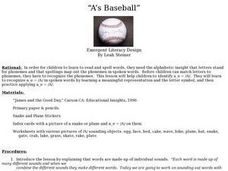Curated OER
Fish Wish
Students identify /sh/ sound when reading and writing words with the /sh/diagraph. They practice saying "Shhhh" and then read the tongue twister "She sells sea shells and fish by the sea shore." They complete a worksheet circling...
Curated OER
This Glue is Sticky!!
Students examine the letter 'i'. Through instruction and modeling they explore the sound the letter makes, how the letter is written, words that contain the letter, etc. As the teacher reads a story, they identify words with the short...
Curated OER
Icky Sticky
Learners examine the letter 'i'. Through instruction and modeling they explore the sound the letter makes, how the letter is written, words that contain the letter, etc. They identify names of items with the short /i/ sound in them and...
Curated OER
Shhhh! I'm Hunting Wabbits!
Students identify the consonant digraph -sh in words and phrases. They practice recognizing the digraph /sh/ through tongue twisters and storytelling. Students read and spell words and pseudowords containing the -sh digraph.
Curated OER
Diphthongs
Second graders examine and identify the diphthongs /oi/ and /oy/. They discuss the two ways that this sound is spelled and read words containing this vowel combination, create a list of words with /oi/ and /oy/, and complete a worksheet.
Curated OER
Buh, Buh, Buh B!!
Students complete a variety of activities related to the letter "B." As a class they recite a tongue twister, then trace and write the letter "B." Students identify the words in the poem that contain the /b/ sound and draw a picture of...
Curated OER
Aaaaa is for Short /a/
Students identify and interpret the sound of the letter /a/ by looking at pictures and seeing if they can figure out what sound it makes. They practice writing the letter a, both upper and lower case on primary paper. Finally, students...
Curated OER
Where is the Pet?
Students identify rhyming words and explore the usage of spatial words. In this Where Is The Pet lesson, students listen to a poem, repeat the rhymes within the poem, list various of additional rhyming words that can replace the words in...
Curated OER
Ugly Bug/Snuggly Bug
Students demonstrate an understanding of rhyming words by creating buggy pictures and a sentence containing rhyming words. They listen to the story, 'Creepy Beetles,' then engage in an activity where they identify the rhyming words.
Curated OER
Rhyme Time
Students listen to a variety of stories and identify rhyming words. They sequence events in the story and generate rhymes of their own. They sort words by rhyming families and write rhymes of their own.
Curated OER
Fishing For F's
Students discriminate initial sounds of words and categorize words based on the initial sound. They generate ideas and topics for writing and use prewriting and drafting strategies to formulate text.
Curated OER
Puzzle Fun with Long /O/ and Long /I/ Words
Search this crossword puzzle for words with long /o/ and /i/ sounds. Some of the clues are challenging, so consider completing the most difficult clues together. As an extension, it is suggested that your learners find the homophones in...
Curated OER
The Purple Cow
Students read and discuss the poem, The Purple Cow. In this poetry lesson plan, students discuss the rhyming words in the poem and why this piece of literature is silly or unusual.
Curated OER
Dictionary Skills Review
Elementary and middle schoolers write 12 words in alphabetical order. They answer seven questions using the dictionary skills of pronunciation, breaking words into syllables and finding definitions. Then they answer five questions about...
Curated OER
CVC Words
Practice simple sight words. Focusing on words such as bat, run, and sun, learners explore reading and spelling skills. It is a quick and easy way to review this topic. A teacher could add words to the presentation to make it a richer...
Curated OER
Find the Letters
Help beginning readers recognize that whole words are made up of individual letters. They examine a set of lowercase letters and circle the ones they find in a CVC word. Learners do this for the words bin and cup.
Curated OER
Crying Baby
Pupils practice techniques and strategies with phonics, spelling and word recognition with the sounds of /a/. They read and work on this task with the book, "Cat Nap," and the tongue twister "Alice asked if Annie's active animals were...
Curated OER
Icky Sticky
First graders the /i/ sound by practicing the way the mouth moves while making the sound while saying "icky, sticky." They write the letter "i" using both upper and lower case letters, make words using letterboxes, and write about a...
Curated OER
Compound Words - Individual Activities
In these compound word worksheets, students engage in numerous activities to reinforce what they have learned about compound words. Nine worksheet provide various means of reinforcing the concept including word puzzles and...
Curated OER
A's Baseball
First graders distinguish between short vowel a and long vowel a. They are introduced to the vowel-consonant-e pattern that changes short vowel sounds into long vowel sounds. They practice reading words with the vowel-consonant-e pattern.
Curated OER
Don't Make that Baby Cry
Pupils study the short "a" sound in words by examining the mouth movements made when making the sound. They practice making the sound by pretending they are making baby sounds. Next, they recite a tongue twister that contains a number of...
Curated OER
Copycat, Copycat!
Students observe that sometimes the letter "c" is a copycat letter and sometimes acts like a "k" or an "s" like in the words "cat" and "race". They use Elkonin letter boxes and letters to spell words as they are called out by the...
Curated OER
Iiizzy is Iiicky Sticky!
Students answer a series of questions about the different sounds that the letter I makes. They observe a picture about a girl and the letter I. They practice a tongue twister with the different sounds of I. They practice writing the...
Curated OER
Pooh's Rumbling Tummy
Students recognize the short vowel u in written and spoken language. Through matching and listening activities, they discriminate the vowel sound /u/ from other phonemes. Students identify the phoneme and letter in words and pictures.

